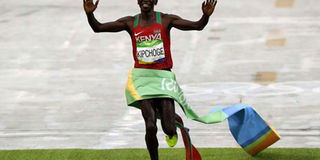Yes, Kenya could have done much better at the Rio Games

Kenya's Eliud Kipchoge celebrates after winning the Men's Marathon athletics event of the Rio 2016 Olympic Games at the Sambodromo in Rio de Janeiro on August 21, 2016. PHOTO | AFP
What you need to know:
- The arrest of a Kenyan official and reports of an abandoned Kenyan athlete forced to beg for a lift from a rival while British athletes were already piling on the medals became a sad harbinger of what lay ahead.
- The rest of the world has upped its game in distance running, in some cases by blatantly dangling passports and cash in front of disenchanted Kenyan athletes.
- Kenya appears to take a laissez-faire approach to talent development by relying on individuals who have proven they can run with little or no resources.
- Kenya is not exactly lacking in funding, the problem is graft and mismanagement.
With the 2016 Rio Olympics done and dusted, it is worth taking stock to see whether Kenya could have done better, albeit having finished top among African countries.
As we congratulate the medal winners and console the losers who did the best they could under conditions that were not always supportive, questions remain about Kenya’s overall performance.
Let us start with a simple question: Why is it that Kenya could only match its 2008 best-ever record with six gold medals while the UK went from 19 gold medals in 2008 to 27 this year? Why does such a wide gulf exist between the best in Africa and the best in Europe? If you think a Kenya-UK comparison is unfair, consider this: there were times in the past when the two countries were virtually neck and neck in their gold medal haul.
In their worst ever performance, in 1996, they could only manage a single gold medal each. In 1988 they each took home five gold medals. That is where the comparison ends. The year 1996 was a watershed. Unfortunately, while Kenya subsequently stagnated on a couple of golds (with the exception of the six in 2008), Team GB went from strength to strength.
Much has been made of the usual bugbears — corruption, mismanagement, ineptitude, and poor team selection. It is a sad reflection of the degeneration of Kenyan sports that the run-up to the Rio games was defined in terms of doping scandals and allegations of corruption.
In the meantime, British athletes were gearing up with resounding wins in everything, from track and field to diving and cycling, in international competitions. The arrest of a Kenyan official and reports of an abandoned Kenyan athlete forced to beg for a lift from a rival while British athletes were already piling on the medals became a sad harbinger of what lay ahead.
What did Team GB do that made such a difference and even toppled the mighty China for second place? The first thing that strikes you is the great diversity of sporting excellence Britain brings. Kenya could only find enough excellent sports men and women for seven events. It fielded only 80 athletes — 51 per cent men and 49 per cent women — aged between 19 and 37.
GREATEST STRENGTHS
Great Britain fielded 374 athletes in 32 events — 55 per cent men and 45 per cent women. They ranged in age from 16 to 61. Britain’s oldest gold medallist is 58 years old. Team GB’s ethnic mix is an admirable testament of multiculturalism, especially compared to fellow European countries except perhaps France.
Britain’s ability to draw from a deep and wide talent pool is one of its greatest strengths, which in turn means entering a wide range of events and maximising the chances of winning medals.
In contrast, Kenya continues to rely on its past medium and long distance glory. Entry into other events, including those it once excelled in such as boxing, is almost an afterthought.
Unfortunately, the rest of the world has upped its game in distance running, in some cases by blatantly dangling passports and cash in front of disenchanted Kenyan athletes.
Kenya appears to take a laissez-faire approach to talent development by relying on individuals who have proven they can run with little or no resources or embracing the sons and daughters of wealthy citizens who can fund their pursuit of vastly underrated sports such as swimming and archery.
Britain, on the other hand, takes a more pro-active approach to nurture and develop sports across the board, investing in facilities, identifying and supporting talent from the early years, not merely waiting to see who is available.
Kenya is not exactly lacking in funding. The problem is graft and mismanagement. One source of funding that made a huge difference to UK sports after that forgettable 1996 debacle is the National Lottery. It is unlikely that Kenya will be ranked alongside Great Britain again any time soon.
The gap has yawned too wide in the past 20 years. But it can certainly improve its world ranking. That will require nothing short of a miracle.
The writer is a professor of human resource management at Nottingham University and director of the Africa Research Group.




